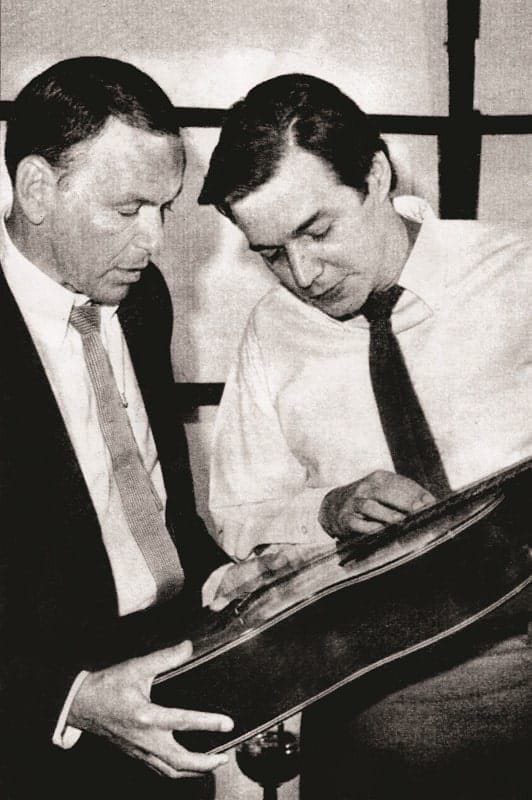
“The meaning of existence, oh, my love…”
By Mahnuel Muñoz
In 1999 I took my first steps as a Sinatra fan. After acquiring some bargain CDs with Columbia recordings and the usual “Greatest Hits”, I needed to explore deeper, and with that intention I went to a store, in search of some of those luminous slices of swing cut in the Capitol years: Poor beginner me, with a handwritten list of titles and some comments caught on the fly in books, magazines or conversations!
I was trying to decide what to buy when a man next to me pointed to a cover I didn’t know about and told me flatly: “Take the one he recorded with Jobim. It’s exquisite.” I looked at that man. He was in his sixties, well-carried, with a poise that revealed that he had probably spent more than half of it under the spell of the Voice. Surely he spoke properly.
But Jobim? I knew Jobim from “The Girl from Ipanema” and little else. It would never have occurred to me that he and Sinatra would record together.
“Thank you,” I said with a trace of a smile, “but I’m looking for one in particular,” I lied, and didn’t follow his advice. I was a twenty-something, a rock deserter, dazzled by icons. For me, Sinatra was that pagan god who invited me to dance and fly with him from the covers of Capitol, and not that aging man, with receding hair and smoking with a lost expression on the cover of the album with Jobim. Where was the tilted hat, the irresistible smile of “rockers, you’re not going to be able to beat me” and the arrangements of Nelson Riddle or Billy May? With my lack of training in ‘Sinatrism’ I associated, freely and strangely, that album, that image, with a stage in decline of the artist, in which he would have to turn to other singers to remain in the market… How ashamed it makes me today day recognize this!
I bought “Swing Easy” (Monument! ) and went out happily on the street. I stopped to have a coffee next to the Teatro Real and between sips of Arabica and paragraphs from the libretto of “Swing Easy” I began to listen to “The Girl From Ipanema” on the public address system, in that unmistakable voice that gave an elegant and charming touch to a song covered ad nauseam. Her pictorial interpretation immediately placed me on the hot sand, at the edge of the sea, placing my helpless eyes on the goddess of Rio, tanned and indifferent, and toasting Frank and Antonio to their impossible loves. I smiled at how defenseless we are against coincidences. And “Dindi” sounded, like the pen of destiny signing a sentence.
“Excuse me,” I asked the young waiter behind the bar, carefully placing some croissants on a tray, “What record is playing?”
“One of Sinatra and Jobim’s bossa,” he responded, and after a brief pause and a croissant line-up, he signed: “He’s awesome.”
At first curious, then bewitched, I had another coffee and one of the croissants in formation. I listened to the entire album. He was a new Sinatra for me. I felt his singing like a friend’s conversation. Close and ethereal, vulnerable and invincible. Later I learned that in those days his marriage to Mia Farrow was adrift and I understood that Sinatra tells everything that happens and what happens to him in every note of his singing.
And I was also captivated by the sound of bossa nova, which journalist Ruy Castro accurately defines as the harmony of happiness and the most seductive music in the world. It didn’t take me long to delve into the lives and works of Jobim, Vinicius De Moraes, Toquinho, Maria Bethania and many others.
In the cafe next to the Real, the clock told me that there was still time to return to the store and make amends for my rudeness to the Sinatra and Jobim album.
The album was still there, but not my prescriber, to whom I would have liked to apologize and thank him. I did it mentally and took my first album of the Reprise era in my hands. While I write I hear it in the background and I raise a glass of Cachaça to the health of that wonderful stranger, of Frank and Antonio, blessed bastards, of all the girls of Ipanema (literal and figurative) and for all the lonely hearts that have not been admitted at Sergeant Pepper’s Club.
If you want to visit more articles about the life of Frank Sinatra enter the following Sinatra Radio 24h link: https://sinatraradio24h.com/category/articles/
We remind you that you can also listen to Sinatra Radio 24 hours on your mobile phone by downloading our free applications for Android in the Play Store https://play.google.com/store/apps/details?id=sinatra.radio24h








